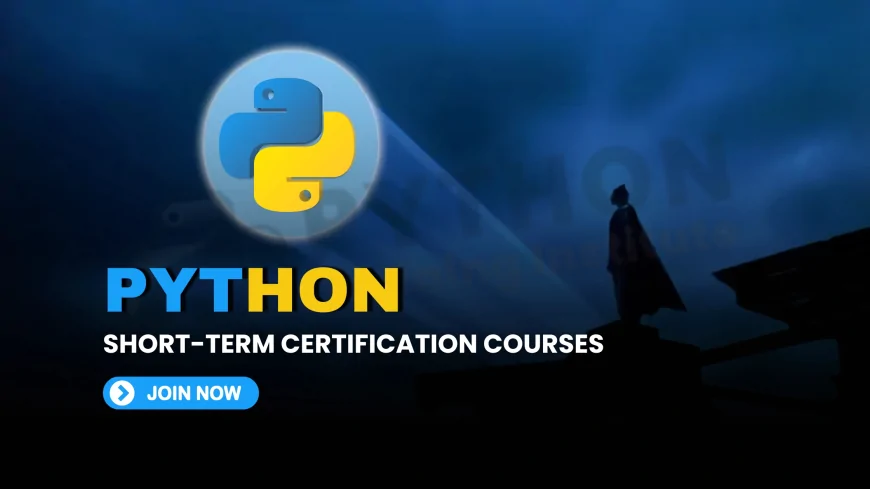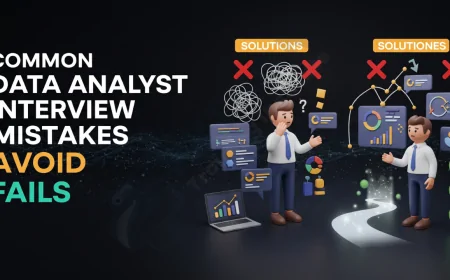Short-Term Python Certification Courses in Pune | Python Certificate Classes for Busy Learners Pune
Discover top short-term Python certification courses in Pune. Learn Python quickly with hands-on training, flexible batches, and industry-recognized certificates. Perfect for students, job seekers, and working professionals.

Table of Contents
- Introduction
- Why Choose Short-Term Python Certification?
- Key Benefits of Short-Term Python Courses in Pune
- Who Should Join These Courses?
- Typical Course Structure & Curriculum
- Top Institutes Offering Short-Term Python Courses in Pune
- Online vs. Offline Short-Term Python Courses
- Course Fees, Duration, and Certification Details
- Career Opportunities After Short-Term Python Certification
- Student Reviews & Success Stories
- How to Choose the Right Python Course in Pune?
- Frequently Asked Questions (FAQs)
- Conclusion
Introduction
Python is a widely adopted programming language, especially popular for its simplicity, readability, and powerful libraries. In Pune—a fast-growing tech hub—professionals and students alike are turning to short-term Python certification courses to quickly upskill and unlock better job opportunities. These accelerated courses offer flexibility and industry-relevant skills within a condensed time frame.
Why Choose Short-Term Python Certification?
Opting for a short-term Python certification course, especially in a tech-focused city like Pune, offers an excellent balance between time investment and career returns. Whether you're a student, job seeker, or professional, these programs are tailored to help you gain real skills fast, without compromising on quality.
Here’s a detailed breakdown of why choosing a short-term Python certification is a smart decision:
1. Fast-Track Career Entry
-
Time-saving: Most short-term Python courses range from 4 to 8 weeks, giving you quick access to real-world programming skills.
-
Ideal for: College students, freshers, and professionals looking to enter tech roles quickly.
“Instead of spending 6 months in a generic programming course, you can get job-ready in 30–45 days with focused Python training.”
2. Hands-On & Project-Oriented
-
These certifications are highly practical, often including:
-
Live projects
-
Mini assignments
-
Use cases like data scraping, automation, or web apps
-
-
You graduate not just with knowledge, but with a portfolio.
“You don’t just learn Python—you build something with it.”
3. Industry-Recognized Certification
-
You receive a certificate of completion or merit that:
-
Adds credibility to your resume
-
Helps in interviews
-
Qualifies you for internships or entry-level jobs
-
-
Some institutes even offer ISO-certified or partner-accredited certificates.
“A certified course stands out more than self-study on your CV.”
4. Job-Oriented Curriculum
-
Short-term Python courses are designed to align with market needs:
-
Python for automation
-
Python with data science libraries
-
Python for web development (Flask/Django)
-
-
These skills directly translate into employability.
“The curriculum is lean, modern, and focuses on what companies actually use.”
5. High ROI (Return on Investment)
-
Typically priced affordably (₹5,000–₹20,000), short-term courses are:
-
Economical
-
Time-efficient
-
Often include placement or internship assistance
-
-
The ROI is often realized within 1–3 months of completing the course.
“Spend a few weeks and a few thousand rupees, and get access to a ₹3–6 LPA job.”
6. Flexible Learning Schedules
-
Options include:
-
Weekend batches (great for working professionals)
-
Evening classes
-
Fast-track weekday formats
-
Online learning with recorded sessions
-
-
These fit into busy schedules, letting you upskill without sacrificing your current job or education.
“You don’t need to quit your job or skip college to learn Python.”
7. Foundation for Advanced Tech Domains
-
Python is the first step to bigger opportunities:
-
Data Science
-
Artificial Intelligence
-
Cybersecurity
-
Machine Learning
-
Web & App Development
-
-
Short-term certification builds your core Python skills, setting the stage for deeper specialization.
“Python is the gateway language to the entire tech ecosystem.”
8. Globally Relevant Skill
-
Python is ranked among the top 3 programming languages worldwide, used by companies like:
-
Google, Netflix, Spotify, NASA, Facebook
-
-
Your certification and skills are not just local—they’re globally relevant.
“Python is used everywhere—from Indian startups to Silicon Valley giants.”
9. Guidance from Industry Experts
-
Institutes in Pune like SevenMentor, Webasha, Ethans, and 3RI offer training by:
-
Corporate professionals
-
Engineers from TCS, IBM, Cognizant, etc.
-
Real-world mentors who guide you beyond the syllabus
-
Learn from those who’ve done it in the field—not just in theory.”
10. Placement & Internship Support
-
Most short-term certification courses offer:
-
Resume building
-
Interview preparation
-
Job alerts
-
Direct placement support
-
-
Many learners get placed within weeks of course completion.
“It’s not just a course—it’s a job launchpad.”
Unlike long-term degree programs, these short-term Python courses are focused, affordable, and job-oriented.
Key Benefits of Short-Term Python Courses in Pune
- Fast-Track Learning: Gain hands-on skills in just 4 to 8 weeks
- Industry-Relevant Curriculum: Covers real-world use cases including web development, automation, and data analysis
- Affordable Fees: Most courses are under ₹10,000
- Flexible Timings: Evening, weekend, and online batches available
- Certification: Receive certificates recognized by tech employers
Who Should Join These Courses?
If you fall into any of the following categories, a short-term Python certification course in Pune might be ideal for you:
- College students (especially engineering and IT)
- Non-CS graduates switching careers
- IT professionals transitioning into data science or automation
- Entrepreneurs building tech products or tools
Typical Course Structure & Curriculum
Most short-term Python programs in Pune follow a modular structure that covers:
- Introduction to Python & Environment Setup
- Data Types, Variables, and Operators
- Control Structures – If, Loops
- Functions, Modules, and Error Handling
- Object-Oriented Programming (OOP)
- Working with Files and JSON
- Basic Libraries: NumPy, Pandas (optional)
- Mini Projects or Case Studies
Top Institutes Offering Short-Term Python Courses in Pune
Webasha Technologies
-
Location: Wadgaon Sheri, Pune (within Webasha area)
-
Course Mode: Classroom, Online & Fast-Track
-
Duration: 30–40 days
-
Highlights:
-
Python basics, OOP, GUI, Data Handling, Automation
-
Live project work, resume preparation, and mock interviews
-
Certified training with lifetime access to recorded classes
-
-
Ideal for: IT students, professionals, and freshers
-
Website: webasha.com
Online vs. Offline Short-Term Python Courses
| Feature | Online Courses | Offline Courses (Classroom) |
|---|---|---|
| Flexibility | High | Limited |
| Personal Interaction | Limited | High |
| Cost | Usually lower | Slightly higher |
| Resources | Recorded + Live | Live-only |
| Networking | Low | High |
Course Fees, Duration, and Certification Details
- Duration: 4 to 8 weeks (typically 40 to 60 hours)
- Fees: ₹5,000 to ₹12,000 depending on the institute
- Mode: Online, Classroom, Hybrid
- Certificate: Issued by institute and sometimes partnered platforms like NSDC, Coursera, or Google
Career Opportunities After Short-Term Python Certification
Python opens doors to numerous entry-level and mid-level tech careers, such as:
- Python Developer
- Automation Engineer
- Data Analyst (Junior)
- Backend Developer
- Freelance Python Programmer
Many companies in Pune prefer candidates with hands-on Python knowledge, even without a CS degree.
Student Reviews & Success Stories
"I completed a 6-week Python crash course at webasha and landed a job in automation testing within 2 months." – Rohit Deshmuk
Python weekend batch was perfect for my schedule and helped me create a working portfolio." – Shraddha Kulkarni
How to Choose the Right Python Course in Pune?
With dozens of Python training institutes available in Pune, selecting the right course can be challenging. The key is to match the course structure, delivery format, and outcomes with your goals—whether it’s for a job switch, skill enhancement, or starting from scratch.
Below are essential factors you must consider before enrolling:
1. Define Your Objective Clearly
Ask yourself:
-
Are you learning Python for data science, web development, automation, or general programming?
-
Are you a beginner, intermediate, or career switcher?
-
Do you need certification, or just want to gain skills?
“Your goal will determine the ideal course structure, depth, and specialization.”
2. Check the Institute’s Credibility
Look for:
-
Years of experience
-
Reviews on Google and JustDial
-
Student testimonials
-
Placement records
-
Corporate tie-ups
“Trusted institutes like Webasha, SevenMentor, Ethans, and 3RI have trained thousands with high success rates.”
3. Evaluate the Trainer Profile
Great training depends on great mentors. Check:
-
Whether the trainer has industry experience
-
Is certified in Python (PCAP, PCEP, etc.)
-
Offers practical insights and not just theory
-
Engages in doubt-clearing, live projects, and code reviews
A good trainer bridges the gap between learning and application.”
4. Review the Course Content
Your course should ideally include:
-
Core Python + Advanced Python
-
OOP (Object-Oriented Programming)
-
File handling, Exception Handling
-
Database (MySQL or SQLite)
-
Modules like Flask/Django (for web dev), Pandas/Numpy (for data)
-
Projects (web app, automation script, data report, etc.)
“The syllabus should be job-ready, not just academic.”
5. Choose the Right Course Duration
-
Short-term (4–8 weeks): Ideal for beginners, upskillers, and fast-trackers
-
Intensive Bootcamp (2–4 weeks): For those with tight deadlines
-
Weekend batches: Best for working professionals
-
Flexible learning: Online + Recorded + Live
“The right pace helps you retain and apply knowledge better.”
6. Mode of Delivery: Online vs Offline
-
Offline: More immersive, one-on-one guidance, group collaboration
-
Online: Ideal for flexibility, access to recordings, and remote learning
-
Hybrid: Some institutes offer dual modes—best of both worlds
“Pick what aligns with your comfort and consistency.”
7. Project & Assignment Involvement
A great course should include:
-
Real-world projects (e.g., web apps, automations)
-
Weekly assignments
-
Hackathons or project evaluations
-
Portfolio building
“You learn better when you build something.”
8. Certification Value
Ensure that the certification:
-
Is recognized by companies
-
Mentions the skills or project completed
-
Can be shared on LinkedIn or resumes
“Don’t settle for a certificate that doesn’t add weight to your profile.”
9. Placement Support & Career Services
Top institutes offer:
-
Resume building
-
Mock interviews
-
Career counseling
-
Job alerts or direct interview calls
“Your training should lead to employment or internship opportunities.”
10. Compare Course Fees & ROI
Typical fees in Pune:
-
₹5,000–₹10,000 for short-term basic courses
-
₹10,000–₹20,000 for advanced modules with project & placement
Make sure the value of content, mentorship, and certification justifies the price.
“Don’t just look at price—look at what you’re getting in return.” Bonus: Checklist Before You Enroll
| Criteria | Ideal Condition |
|---|---|
| Institute Reputation | 4.5+ Google rating, positive reviews |
| Trainer Background | 5+ years industry experience, certified |
| Syllabus Depth | Covers core + real-world Python skills |
| Mode of Learning | Fits your schedule: online, offline, or hybrid |
| Projects/Assignments | Minimum 2–3 real projects |
| Certificate Quality | Recognized by employers |
| Placement Services | Resume, mock interviews, job referrals |
| Fee vs Value | Justified by outcomes and content |
Frequently Asked Questions (FAQs)
1. What is a short-term Python certification course?
A short-term Python certification course is a quick-duration program, usually 4 to 8 weeks, designed to teach essential Python programming skills for job readiness or skill enhancement.
2. Who should enroll in a short-term Python course in Pune?
Students, freshers, working professionals, and career changers from both IT and non-IT backgrounds can benefit from these fast-track courses.
3. Are short-term Python courses suitable for beginners?
Yes, most short-term Python courses start from the basics and gradually move to advanced topics, making them ideal for beginners.
4. What is the average fee for short-term Python courses in Pune?
The fees typically range from ₹5,000 to ₹20,000 depending on the institute, course duration, and inclusions like projects or certifications.
5. Do these courses offer placement assistance?
Yes, many reputed institutes like SevenMentor, Webasha, and 3RI provide job assistance, resume building, and interview preparation.
6. Can I take these courses online?
Yes, most institutes in Pune offer both classroom and online formats, including live virtual classes and recorded sessions for flexible learning.
7. How long does it take to complete a short-term Python course?
It usually takes 4 to 8 weeks, depending on the course schedule and intensity—some fast-track courses can even be completed in 2 weeks.
8. Will I get a certificate after completing the course?
Yes, you’ll receive a certification of completion which is often recognized by local companies and helpful in boosting your resume.
9. What topics are covered in short-term Python training?
Common topics include Python basics, data types, functions, OOP, file handling, modules, and often Flask or Django for web development.
10. Are the instructors experienced?
Yes, leading institutes hire trainers with 5+ years of industry experience, often from top companies like TCS, Infosys, or Cognizant.
11. Can non-technical individuals learn Python through these courses?
Absolutely. Python is beginner-friendly, and these courses are structured to help even non-tech learners grasp coding fundamentals.
12. Is Python in demand in Pune’s job market?
Yes, Python is widely used in Pune’s growing IT sector, especially in areas like data science, automation, web development, and AI.
13. Do these courses include real-time projects?
Yes, hands-on projects are a key part of short-term Python courses to help learners apply their knowledge and build a portfolio.
14. Can I do these courses while working full-time?
Yes, many institutes offer evening, weekend, or online classes to suit working professionals’ schedules.
15. What if I miss a class?
Most institutes provide recorded sessions, extra doubt-solving classes, or backup sessions if you miss a lecture.
16. Is Python good for freelancing or entrepreneurship?
Yes, Python is great for freelance opportunities in automation, scripting, data analytics, and building web applications or tools.
17. Are there any prerequisites to join?
No, most short-term Python certification courses require no prior coding knowledge—just basic computer literacy.
18. Will the course help me transition to a data science career?
Yes, Python is the foundation for data science. Completing a short-term Python course is a perfect first step toward that career path.
19. How can I identify a good training institute in Pune?
Check Google reviews, trainer experience, placement record, syllabus relevance, and demo classes before finalizing.
20. What is the career scope after completing a short-term Python course?
Post-course, you can apply for roles like Python Developer, Automation Tester, Web Developer, or Junior Data Analyst, depending on your additional skills.
Conclusion
Short-term Python certification courses in Pune are an excellent gateway into programming, automation, and data-related careers. Whether you’re a student, a working professional, or someone transitioning into tech, these compact courses can give you a strong foundation in Python within weeks—without burning a hole in your pocket. Enroll in a reputed institute, work on projects, and start your coding journey today!
What's Your Reaction?
 Like
0
Like
0
 Dislike
0
Dislike
0
 Love
0
Love
0
 Funny
0
Funny
0
 Angry
0
Angry
0
 Sad
0
Sad
0
 Wow
0
Wow
0















